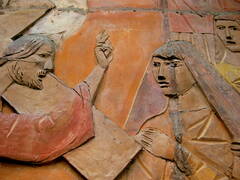Eighth Station of the Cross
Jesus meets the
women of Jerusalem
who weep for him
with Cardinal Joseph Ratzinger
Good Friday 2005, at the Colosseum in Rome
From the Book of the Prophet Isaiah (53: 2-3)
He had no form or comeliness that we should look at him, and no beauty that we should desire him. He was despised and rejected by men; a man of sorrows, and acquainted with grief; and as one from whom men hide their faces he was despised, and we esteemed him not.
From the Gospel according to Luke (23: 28-31)
Jesus turning to them said, “Daughters of Jerusalem, do not weep for me, but weep for yourselves and for your children. For behold, the days are coming when they will say, ‘Blessed are the barren, and the wombs that never bore, and the breasts that never gave suck!’ Then they will begin to say to the mountains, ‘Fall on us’; and to the hills, ‘Cover us’. For if they do this when the wood is green, what will happen when it is dry?”
Meditation
Hearing Jesus reproach the women of Jerusalem who follow him and weep for him ought to make us reflect. How should we understand his words? Are they not directed at a piety which is purely sentimental, one which fails to lead to conversion and living faith? It is no use to lament the sufferings of this world if our life goes on as usual. And so the Lord warns us of the danger in which we find ourselves. He shows us both the seriousness of sin and the seriousness of judgement. Can it be that, despite all our expressions of consternation in the face of evil and innocent suffering, we are all too prepared to trivialize the mystery of evil? Have we accepted only the gentleness and love of God and Jesus, and quietly set aside the word of judgement? “How can God be so concerned with our weaknesses?”, we say. “We are only human!” Yet as we contemplate the sufferings of the Son, we see more clearly the seriousness of sin, and how it needs to be fully atoned if it is to be overcome. Before the image of the suffering Lord, evil can no longer be trivialized. To us too, he says: “Do not weep for me, weep for yourselves... if they do this when the wood is green, what will happen when it is dry?”
Prayer
Lord, to the weeping women you spoke of repentance and the Day of Judgement, when all of us will stand before your face: before you, the Judge of the world. You call us to leave behind the trivialization of evil, which salves our consciences and allows us to carry on as before. You show us the seriousness of our responsibility, the danger of our being found guilty and without excuse on the Day of Judgement. Grant that we may not simply walk at your side, with nothing to offer other than compassionate words. Convert us and give us new life. Grant that in the end we will not be dry wood, but living branches in you, the true vine, bearing fruit for eternal life.
Our Father ... Let me share with you his pain who for all my sin was slain, who for me in torments died.
8ª estación -Jesús encuentra a las mujeres de Jerusalén 
Meditaciones y Oraciones del Cardenal Joseph Ratzinger (Papa Benedicto XVI)
8ème station - Jésus rencontre les femmes de Jérusalem qui pleurent sur lui 
Méditations et prières du Cardinal Joseph Ratzinger (Pape Benoît XVI) au Colisée
Music: from 'Triduum - Contemporary Sacred Music' by David Bevan & Neil Wright.
To download the free mp3 audio recordings individually, right/double click on the blue play buttons.
Plus, you can listen / subscribe to the Via Crucis podcasts in English, French, Portuguese & Spanish on Spotify, iTunes or from Totus2us' RSS feeds.
with Julian of Norwich 
We adore you, O Christ, and we praise you.
Because by your holy cross you have redeemed the world.
And there followed him a great multitude of the people and of women who bewailed and lamented him. But Jesus turned to them and said: “Daughters of Jerusalem, do not weep for me, but weep for yourselves and for your children.” (Luke 23: 27-28)
But specially and highly and with full lovely manner of look, it was shown me that we shall meekly bear and suffer the penance that God himself gives us with a mind to his blessed Passion. For when we have a mind in his blessed Passion, with pity and love, then we suffer with him as did his friends who saw it. Flee we to our Lord and we shall be comforted. (Julian of Norwich - XVI Revelation, Ch 77)
I love you Jesus, my love, above all things; I repent with my whole heart for having offended you.
Never permit me to separate myself from you again.
Grant that I may love you always, then do with me as you will.
Our Father ... Hail Mary ... Glory be.
with Pope St John Paul II in the Jubilee Year
Good Friday, 21 April 2000, at the Colosseum in Rome
- also in French, German, Italian, Portuguese & Spanish
“Daughters of Jerusalem, do not weep for me,
but weep for yourselves and for your children.
For behold, the days are coming when they will say,
'Blessed are the barren, and the wombs that never bore,
and the breasts that never gave suck!'
Then they will begin to say to the mountains,
'Fall on us'; and to the hills, 'Cover us.'
For if they do this when the wood is green,
what will happen when it is dry?” (Lk 23:28-31).
These are the words of Jesus to the women of Jerusalem who were weeping with compassion for the Condemned One.
“Do not weep for me, but weep for yourselves and for your children.” At the time it was certainly difficult to understand the meaning of these words. They contained a prophecy that would soon come to pass.
Shortly before, Jesus had wept over Jerusalem, foretelling the terrible fate that awaited the city.
Now he seems to be referring again to that fate: “Weep for your children . . .” Weep, because these, your very children, will be witnesses and will share in the destruction of Jerusalem, the Jerusalem which “did not know the time of her visitation”.
If, as we follow Christ on the way of the Cross, our hearts are moved with pity for his suffering, we cannot forget that admonition.
“For if they do this when the wood is green, what will happen when it is dry?”
For our generation, which has just left a millennium behind, rather than weep for Christ crucified, it is now the time for us to recognize “the time of our visitation”. Already the dawn of the resurrection is shining forth.
“Behold, now is the acceptable time; behold, now is the day of salvation” (2 Cor 6:2).
To each of us Christ addresses these words of the book of Revelation: “Behold, I stand at the door and knock; if any one hears my voice and opens the door, I will come in to him and eat with him, and he with me. He who conquers, I will grant him to sit with me on my throne, as I myself conquered and sat down with my Father on his throne” (3: 20- 21).
Prayer
O Christ, you came into this world to visit all those who await salvation.
Grant that our generation will recognize the time of its visitation
and share in the fruits of your redemption.
Do not permit that there should be weeping for us and for the men and women of the new century
because we have rejected our merciful Father’s outstretched hand.
To you, O Jesus, born of the Virgin Daughter of Zion, be honour and praise for ever and ever. Amen.
with Papa San Giovanni Paolo II in 2003
- also in French, German, Italian, Portuguese & Spanish
From the Gospel according to Luke (23: 28-31)
But Jesus turning to them said, "Daughters of Jerusalem do not weep for me, but weep for yourselves and for your children. For behold the days are coming when they will say, blessed are the barren, and the wombs that never bore and the breasts that never gave suck. Then they will begin to say to the mountains, 'Fall on us'; and to the hills, 'Cover us.' For if they do this when the wood is green, what will happen when it is dry?"
Meditation
Here is a call to repentance, true repentance, and sorrow at the reality of the evil that has been committed. Jesus says to the daughters of Jerusalem who are weeping at the sight of him: "Do not weep for me, but weep for yourselves and for your children" (Lk 23:28). One cannot merely scrape away at the surface of evil; one has to get down to its roots, its causes, the inner truth of conscience.
This is precisely what Jesus means to say as he carries his Cross: he always "knew what was in man" and he continues to know it. That is why he must always be for us the closest onlooker, the one who sees all our actions and is aware of all the verdicts which our consciences pass on them. Perhaps he even makes us understand that these verdicts have to be carefully thought out, reasonable and objective (for he says: "Do not weep"), while at the same time bound up with all that this reality contains: he warns us of this because he is the one who carries the Cross.
Lord, let me know how to live and walk in the truth.
Acclamation
Lord Jesus, knowing and merciful, the Truth leading us to life.
R. Kyrie, eleison.
Lord Jesus, the compassionate one, whose presence eases our pain in the hour of trial.
R. Kyrie, eleison.
with St John Henry Newman
V. We adore you, O Christ, and we bless you.
R. Because by your holy Cross you have redeemed the world.
At the sight of the sufferings of Jesus the Holy Women are so pierced with grief that they cry out and bewail Him, careless what happens to them by so doing. Jesus, turning to them, said, "Daughters of Jerusalem, weep not over Me, but weep for yourselves and for your children."
Ah! can it be, O Lord, that I shall prove one of those sinful children for whom Thou biddest their mothers to weep. "Weep not for Me," He said, "for I am the Lamb of God, and am making atonement at My own will for the sins of the world. I am suffering now, but I shall triumph; and, when I triumph, those souls, for whom I am dying, will either be my dearest friends or my deadliest enemies." Is it possible? O my Lord, can I grasp the terrible thought that Thou really didst weep for me — weep for me, as Thou didst weep over Jerusalem? Is it possible that I am one of the reprobate? possible that I shall lose by Thy passion and death, not gain by it? Oh, withdraw not from me. I am in a very bad way. I have so much evil in me. I have so little of an earnest, brave spirit to set against that evil. O Lord, what will become of me? It is so difficult for me to drive away the Evil Spirit from my heart. Thou alone canst effectually cast him out.
Pater, Ave, Gloria ...
V. Have mercy on us, O Lord.
R. Have mercy on us.
May the souls of the faithful, through the mercy of God, rest in peace. Amen.



